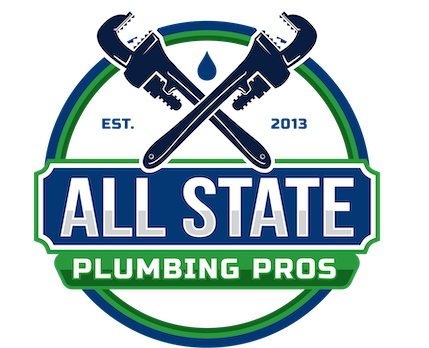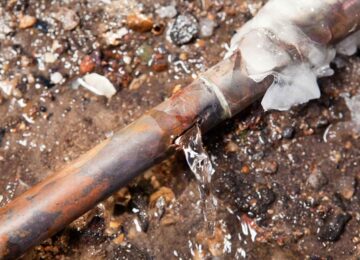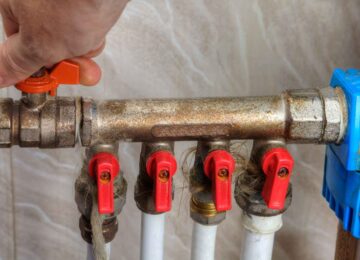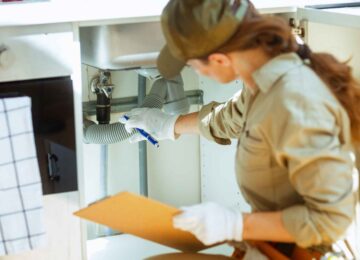Clogged drains are one of the most common plumbing issues for homeowners. Whether it’s a clogged kitchen sink, a slow-draining shower, or a toilet that struggles to flush, these blockages can disrupt daily life and even cause costly repairs. Learning how to prevent clogged drains protects your plumbing system and saves you from emergencies.
In Fairfield County, CT, and Westchester County, NY, older homes and seasonal weather can make pipes especially prone to buildup. Grease, food scraps, soap scum, and paper products often sneak into the drain pipes and drainage system, where they harden and trap other debris. The good news is that simple drain maintenance and professional services can keep your pipes running smoothly.
At All State Plumbing Pros, our licensed team offers 24/7 solutions, including drain cleaning, emergency plumbing, and water heater services.
What Causes Clogged Drains?
Most drain clogs, including clogged drains, are caused by waste material that doesn’t belong in the pipes. When items like grease or hair enter the system, they stick to the walls of the drain pipes, trapping more debris until water flow is completely blocked.
- Kitchen drains: Grease, oils, leftover food, coffee grounds, and fibrous items such as banana peels, potato skins, and egg shells often cause a clogged sink. Even running cold water doesn’t fully prevent grease from hardening inside pipes.
- Bathroom drains: Hair, soap buildup, excess toilet paper, dental floss, cotton swabs, and feminine hygiene products can clog bathroom sinks, tub drains, and toilets.
- Outdoor drains: Leaves, yard debris, and seasonal runoff can block gutters, sump pumps, and French drains. In CT/NY, heavy fall foliage makes outdoor drainage especially vulnerable.
Kitchen Drain Prevention Tips
The kitchen sink is one of the busiest parts of your home’s plumbing system, which makes it highly susceptible to clogs. Grease is a leading cause because once it cools, it solidifies inside pipes and attracts other waste material. Starchy foods like pasta and rice expand in water, while fibrous scraps like celery and potato skins can wrap around a garbage disposal blade.
How to keep drains clear in the kitchen:
- Do:
- Scrape leftover food into the trash or compost bin instead of rinsing it down the sink.
- Use a drain strainer or sink screen to catch food scraps and debris.
- Run hot water after dishwashing to help flush away soap and other residue.
- Don’t:
- Pour grease or oil into the sink. Store it in a sealable container and throw it in the trash.
- Grind fibrous waste like corn husks or banana peels in the disposal.
- Wash down coffee grounds, pasta, or rice.
Unlike chemical drain cleaners that can corrode pipes, bacterial drain cleaners or enzyme-based solutions are safe for regular maintenance. These products break down organic buildup naturally and help prevent clogs without harming your plumbing system.
Bathroom Drain Prevention Tips
From sinks to showers, bathroom drains are notorious for clogs. Using a hair-catching brush can prevent loose hair from combining with soap scum, which forms sticky blockages that trap other debris like cotton swabs, floss, and wipes.
Ways to prevent bathroom clogs:
- Install hair catchers or drain screens in shower drains and tub drains.
- Brush hair before showering to reduce loose strands.
- Clean drain stoppers weekly to remove soap scum and hair buildup.
- Only flush toilet paper and human waste, never baby wipes, paper towels, or feminine hygiene products.
To keep pipes clear, flush bathroom sinks with hot water weekly. If odors or slow drainage persist, it may be time to check the p-trap or schedule professional cleaning. For persistent clogs, All State Plumbing Pros offers expert residential plumbing solutions.
Outdoor and Seasonal Drain Care
Your drainage system doesn’t stop indoors; yard and basement drains can also clog. In CT and NY, heavy fall rains and excess paper from leaves often overwhelm outdoor drains, leading to backups in sump pumps or basement drains.
Tips for outdoor drain maintenance:
- Clean gutters and downspouts in spring and fall.
- Install drain guards or gutter screens to keep out leaves.
- Test sump pumps before heavy rains; clear the intake of any other debris.
- Inspect French drains and outdoor pipes for blockages.
Adding outdoor drain care to your seasonal checklist prevents water damage and protects foundations.
How Often Should You Clean Drains?
Preventive drain maintenance is the best way to stop clogs before they start. Many homeowners wait until drains clog, but a routine schedule keeps pipes healthy and reduces the need for costly repairs.
Drain Maintenance Schedule:
- Weekly: Run hot water down sinks and clean drain stoppers.
- Monthly: Use enzyme or bacterial drain cleaners to break down buildup.
- Seasonally: Schedule professional inspections, especially before heavy fall leaf buildup or freezing winter conditions.
This simple routine keeps water flowing and prevents the need for harsh chemical drain cleaners that can damage pipes.
When to Call a Professional Plumber
Some clogs go beyond home remedies. If you notice recurring drain clogs, backups, or sewage odors, it’s time for professional help. A plumber can use augers, bent wire tools, or camera inspections to diagnose the problem and hydro jetting to fully clear the pipes.
Signs you need professional drain cleaning:
- Multiple drains are clogging at once.
- Water is backing up in toilets, sinks, or floor drains.
- Gurgling noises from drains.
- Foul odors from the plumbing system.
All State Plumbing Pros provides 24/7 emergency plumbing throughout Fairfield County, CT, and Westchester County, NY.
Conclusion
Clogged drains are often caused by everyday waste grease, food scraps, hair, soap scum, and paper products, that gradually narrow pipes until water flow stops. By following preventive steps like using drain strainers, cleaning stoppers, and keeping grease and toilet paper out of sinks, you can protect your plumbing system and avoid costly repairs.
If your sink won’t drain, your shower fills with standing water, or clogs keep coming back, don’t wait until the problem escalates. At All State Plumbing Pros, our licensed plumbers are available 24/7 for homeowners and businesses across Connecticut and New York. From emergency drain cleaning to full plumbing system repairs, or using cold water to help clear minor clogs, contact us today for fast, reliable service you can count on.
FAQs
How do I stop my drain from clogging?
Avoid pouring grease, food scraps, or coffee grounds into sinks. Use hair catchers in the bathroom and clean drain stoppers weekly. If clogs persist, schedule professional cleaning.
How do you prevent drainage blockage?
Blockages can be prevented by installing drain screens, cleaning gutters, and practicing safe disposal habits indoors. Never flush baby wipes, paper products, or feminine hygiene items.
How do I unclog my drain naturally?
A natural option is to pour hot water, followed by a half cup of baking soda and vinegar, letting the mixture sit for 15 minutes before flushing with boiling water. This helps with minor buildup but won’t fix severe clogs.
Why should you never use baking soda and vinegar to unclog a drain?
While the fizzy reaction looks effective, it doesn’t dissolve grease or hair clogs. Overuse may loosen pipe joints. Enzyme or bacterial drain cleaners are safer alternatives.

![How to Prevent Clogged Drains: Expert Plumber Tips Clogged drains are one of the most common plumbing issues for homeowners. Whether it’s a clogged kitchen sink, a slow-draining shower, or a toilet that struggles to flush, these blockages can disrupt daily life and even cause costly repairs. Learning how to prevent clogged drains protects your plumbing system and saves you from emergencies. In […]](https://allstateplumbingct.com/wp-content/uploads/2025/10/how-to-prevent-clogged-drains-750x420.jpg)



Leave a Reply